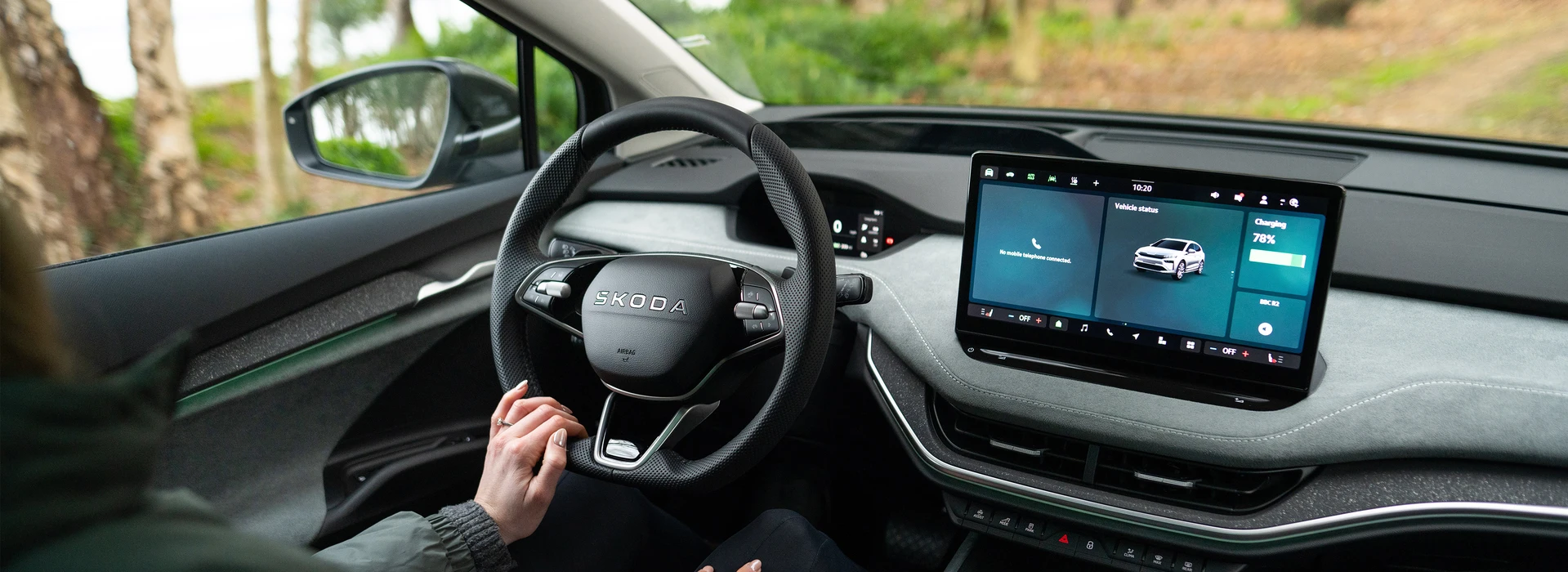Electric car batteries explained
Electric car batteries explained
How long does an electric car battery last?
An electric car battery typically lasts between 10 and 15 years, depending on how it’s used and cared for. All new Škoda electric cars have a battery warranty that covers defects for eight years or up to 100,000 miles, whichever comes first.
Charging your electric car battery
When considering switching to electric, some drivers worry about running out of charge on the road. But thanks to innovative home charging solutions and a growing network of public chargers, that becomes less likely by the day. From installing a wall-box at home to plugging in at the shops or work, there are plenty of ways to keep your car topped up and ready to go.
How far can I go in one charge
All Škoda electric cars have a range figure calculated using the WLTP test that all cars undertake. To help you further, our Range Calculator helps you personalise this range figure for all our models to include the types of road you drive on, the time of year and even your driving style.
What does kWh mean?
A kilowatt-hour (kWh) is a unit of energy storage. Using 1 kilowatt (kW) of continuous power for 1 hour will use 1 kWh of energy. Efficiency in an electric vehicle is measured by how many miles the car travels using 1 kWh of energy. Our handy Fuel savings calculator helps you work out how much you could save on fuel with an electric vehicle.
Electric car battery FAQ
New Škoda electric and hybrid vehicles are covered by the Škoda Warranty, which includes right for a free repair of the high-voltage battery if the defect occurs within 8 years or before the mileage of 160,000 km/100,000 miles is reached (whichever comes first) from the start of the Škoda Warranty. For fully electric Škoda vehicles, Škoda Warranty includes a guarantee that the total capacity of the high-voltage battery will not fall below 70% of its original total usable capacity for the above-mentioned time period or milage limit.
Free repair of the high-voltage battery and capacity guarantee are subject to the fulfilment of the Škoda Warranty conditions, which are included in the documentation provided during the sale of a new vehicle.
Yes, Lithium-ion batteries are nearly 100% recyclable. They contain many useful metals and rare-earth elements, which make them beneficial to recycle in order to prevent future shortages.
The high voltage (HV) electric battery recycling is critical to our industry. After the vehicle life, the HV electric battery can be reused in something else which is the most economical form of recycling enabling us to benefit from the amount of energy that is still available in the HV electric battery. Once the lithium-ion battery is completely unusable it is recycled in a specialised facility. Read more about our battery recycling here.
Like conventional cars, electric cars are subject to standard crash tests and have reported good results. The batteries are completely insulated from the rest of the car, and in the event of an accident, the whole system is disconnected.
Both types are fitted with a charging socket, but otherwise they’re fundamentally different. The plug-in hybrid, sometimes referred to as a PHEV (Plug-in Hybrid Electric Vehicle), combines a classic internal combustion engine with an electric motor which can be recharged from an electrical outlet and from energy recovered while driving. A PHEV can also be driven in purely electric mode, but the range is limited.
An EV does not need more maintenance than any other vehicle as regular maintenance and service checks are important for every car to ensure its reliability and safety. Having said that, electric cars don't have oil or transmission fluids that need to be changed, and also have fewer moving parts.
Electric cars use a battery to store electricity, which powers an electric motor instead of a petrol or diesel engine. You recharge the battery by plugging the car into a home charger or public charging point.
BEV stands for Battery Electric Vehicle. It’s a type of car powered entirely by electricity stored in rechargeable batteries, with no petrol or diesel engine.
Electric car batteries store electrical energy in rechargeable cells, usually made from lithium-ion. When you drive, the battery supplies power to the electric motor, which turns the wheels. When you plug the car in, electricity flows back into the battery to recharge it for your next journey.
Electric car charging stations supply electricity to recharge a car’s battery. You connect your car using a charging cable, and the station transfers power at a controlled rate to keep the battery safe.
Discover more
My Škoda iV app
Use our app to compare the running costs of your current petrol or diesel car with a Škoda EV.
